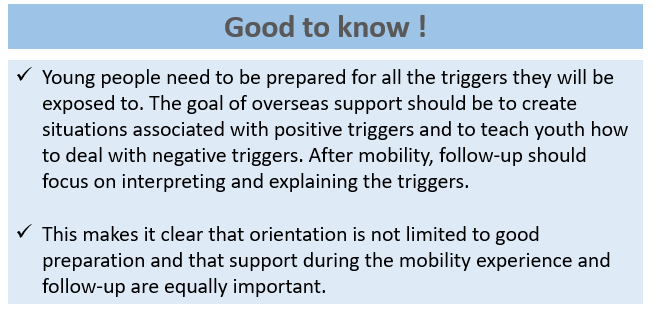The importance of triggers
The International Youth and Visitors Exchange Service of the Federal Republic of Germany (2005) and the AFS Center for Intercultural Studies in New York (1993) have studied the long-term effects of intercultural youth projects.
Whether the experience abroad is perceived as positive or negative depends to a large extent on so-called triggers.
Definition:
Whether the experience abroad is perceived as positive or negative depends to a large extent on so-called triggers.
Definition:
Triggers are specific positive or negative situations that conflict with young people's expectations during the mobility experience and that will remain etched in their memories for years after the exchange. In most cases, triggers are related to the differences observed during the exchange (food...), contacts with "significant persons" (other participants, local programme manager...), group dynamics (conflicts, feeling of solidarity...) and the hospitality of the host country.
Positive triggers will have a positive effect on the young person's personal development; negative triggers will have the opposite effect.

Positive triggers will have a positive effect on the young person's personal development; negative triggers will have the opposite effect.
Applicants should be prepared for all the triggers to which they will be exposed. The objective of overseas support should be to create situations associated with positive triggers and to train applicants to deal with negative triggers.
Post-mobility follow-up should focus on interpreting and explaining the triggers.
Post-mobility follow-up should focus on interpreting and explaining the triggers.
Last modified: lundi, 18 mai 2020, 3:12